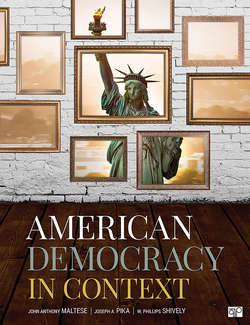Читать книгу American Democracy in Context - Joseph A. Pika - Страница 59
На сайте Литреса книга снята с продажи.
The British Response
ОглавлениеThe reaction of the colonists to the Stamp Act alarmed the British, and in February 1766, Parliament repealed the act. But, in March, it also passed the Declaratory Act, stating that colonial bodies had “against law” claimed “the sole and exclusive right of imposing duties and taxes” in the colonies. Noting that “all [colonial] resolutions, votes, orders, and proceedings” that denied Parliament’s power to tax (including the Virginia Resolves and the Stamp Act Congress’s Declaration of Rights) were “utterly null and void,” the act reiterated that the colonies were “subordinate unto, and dependent upon the imperial crown and Parliament of Great Britain.”10
Then Parliament enacted the Revenue Act of 1767, the first of the so-called Townshend Acts, named after Charles Townshend, the chancellor of exchequer (treasury), who advocated them. Whereas the Stamp Act was a direct tax on goods in the colonies, the Revenue Act (similar to the earlier Sugar Act) was an indirect tax that placed duties on imported goods, including the paper, paint, glass, and tea the colonies imported from England. Townshend assumed that indirect taxes would be more palatable to the colonists than direct taxes, but he was wrong. The Massachusetts House of Representatives reiterated the now-familiar protest: no taxation without representation.
This time, Britain’s response was harsh. It ordered the royal governor to dissolve the Massachusetts legislature. Soon thereafter, it sent regiments of British troops to Boston. The troops, known as “Redcoats” for their bright uniforms, became a hated fixture there. One cold night in March 1770, a group of several hundred men and boys pelted a small band of nine Redcoats with rocks, snowballs, chunks of ice, and oyster shells. Alarmed, the soldiers fired back, killing five men. The British soldiers had been provoked, but the incident was quickly dubbed the “Boston Massacre” and used to rally opposition to the oppressive force of the British. Nonetheless, John Adams—a future president of the United States—defended the British soldiers when they were tried for murder. He secured a verdict of “innocent” for the captain, who was tried first. In a subsequent trial of the remaining eight soldiers, six were acquitted and two were found guilty of the lesser charge of manslaughter.11
Description
Is Revere’s depiction of the Boston Massacre—British soldiers firing point-blank into a small crowd of unarmed colonists and their dog—an accurate portrayal of the event? If not, what is inaccurate about it?
